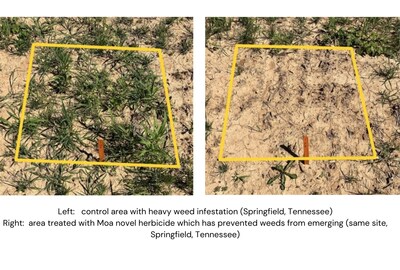
OXFORD, England, Aug. 20, 2024 /PRNewswire/ -- Oxford University spin-out Moa Technology has announced excellent results in multi-country field trials of promising new classes of herbicide with novel modes of action recently discovered by the company.

Weeds pose a serious and increasing threat to food security around the world. With over 270 species of weeds now resistant to existing commercial herbicides, and no new broad-spectrum herbicides brought to market in the last forty years, farmers globally are running out of tools to protect their harvests.
In a presentation to the American Chemical Society in Denver, Colorado titled "Discovering and developing the next generation of herbicides with novel modes of action" Moa revealed that all the chemical classes tested in trials earlier this year showed promising efficacy in the field, demonstrating consistent and robust results across multiple field trials and climatic zones. Trials were conducted in both pre- and post-emergence in wheat, maize and soya and showed a good window of selectivity between weeds and crops to allow for further optimisation. Moa's compounds controlled problem weeds such as Amaranthus sp. (pigweed), Bassia sp. (Kochia) and/or Setaria sp. (foxtail) above the commercially relevant efficacy benchmark (>85% control) with use rates ranging from 1000 g/ha to as low as 250 g/ha. Two of the herbicide candidates demonstrated better broadleaf and grass weed control than existing commercial herbicides on a gram-for-gram basis in the majority of their field trials. A third chemical class, at an earlier stage of development, delivered good control of broadleaf weeds in field trials at slightly higher use-rates.
Following the trials, Moa has already started to optimise the chemistry and formulation of these herbicides to develop them into lower-use rate products for farmers which are affordable, effective and sustainable. Later this year, further trials will take place in the southern hemisphere, as well as first field trials of other compounds in Moa's rich R&D pipeline.
Moa's H1 2024 field trial programme comprised 45 trials using industry standard randomised complete block experiments which included multiple classes of chemistry previously validated in the laboratory and tested in glasshouses. The trials were carried out by independent contract research organisations in California, Tennessee, Spain, France and the UK, covering agricultural production in three different major climate zones.
Presenting the data at the ACS conference, Dr Shuji Hachisu, Chief Technology Officer at Moa, said:
"We are extremely pleased with these field trial results, which are an outstanding validation of our unique approach to herbicide discovery. Our compounds have demonstrated efficacy far beyond what would normally be expected from candidates whose chemistry and formulation have not yet been fully optimised. It is great news for farmers, who are crying out for a new generation of novel, effective, safe, cost effective and sustainable products to combat resistant and problematic weeds."
Spun out of Oxford University in 2017, Moa has developed proprietary technology to discover a whole new generation of synthetic and bio-herbicidal compounds based on novel modes of action, to provide farmers with safe, cost-effective, technologically-advanced solutions at a pace weeds cannot match. In the last three years, Moa's platform has already screened over 750,000 compounds and discovered over 70 promising novel modes of action areas. In July 2024, Moa signed a major partnership with Nufarm to co-develop and commercialise one of these new chemical series.
?Photo - https://mma.prnewswire.com/media/2484777/Moa_Technology_Compound.jpg
![]() View original content:https://www.prnewswire.co.uk/news-releases/moa-announces-international-field-trial-success-at-the-acs-autumn-conference-in-denver-302226244.html
View original content:https://www.prnewswire.co.uk/news-releases/moa-announces-international-field-trial-success-at-the-acs-autumn-conference-in-denver-302226244.html



